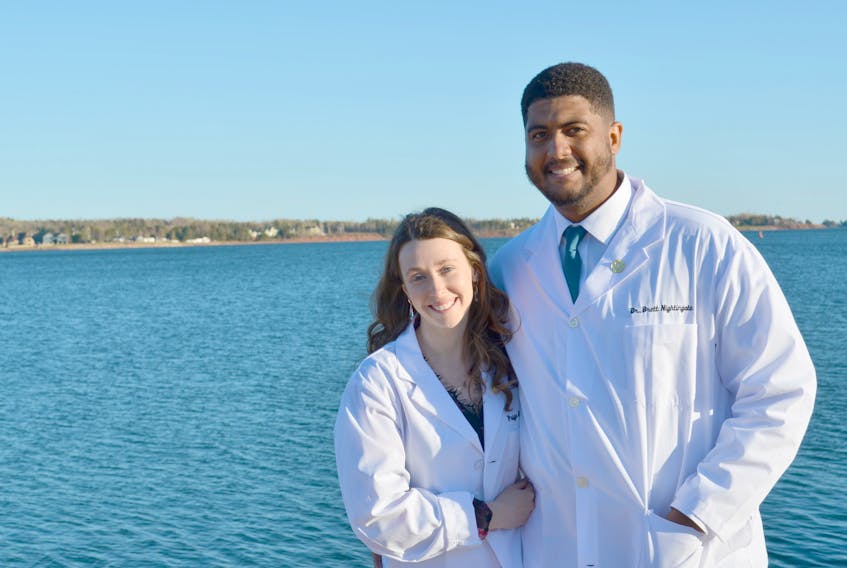CHARLOTTETOWN, P.E.I. - Inflexible immigration bureaucracy is being blamed in preventing an international graduate of a veterinarian program in Charlottetown from pursuing his desire to work in Canada.
Some bad advice from a P.E.I. agency that led to a missed deadline has left Barbados native Brett Nightingale scrambling to stay in this country, where he has a home, a girlfriend and a job.
“I have no status,’’ he says.
“I’m just trying to figure some way to appeal the decision because I was given terribly erroneous information.’’
Nightingale, 29, graduated in May 2018 from the Atlantic Veterinary College (AVC) with a doctor of veterinary medicine – a four-year program costing Nightingale $300,000.
Following graduation, Nightingale started work through an extended student work permit in Navan, Ont., in early June, working in production medicine at a clinic that services dairy farms.
He moved to Ontario with his girlfriend, Cornwall, P.E.I. native Paige Gamester, who also graduated from AVC last year and is currently working with a large animal clinic in that province.
Nightingale was relying on a post-graduation work permit (PGWP) to allow him to work for the next three years in Canada and to likely result in him transitioning to permanent residency.
However, Nightingale learned on Dec. 3 that his application for a PGWP was denied because he applied too late.
He alleges erroneous information from the P.E.I. Association for Newcomers to Canada (PEIANC) led to his current plight. He says was told by a staff person at the Charlottetown association he had until Dec. 31, 2018 – the expiration date listed on his study permit – to apply for the post-graduation work permit. In fact, he only had 90 days following completion of the vet program in May 2018.
PEIANC executive director Craig Mackie did not return Guardian calls seeking comment.
Nightingale says he hopes to continue living in Canada and forging a veterinary career here.
“It’s where I want to be,’’ he says.
“I love Canada. It’s a great place.’’

AVC dean Greg Keefe says Nightingale is qualified to practise veterinary medicine anywhere in Canada and, he adds, Nightingale had landed a job with a very reputable dairy practice before running into the unexpected work permit hurdle.
“It’s a shame that he can’t practice his profession as he is licensed to do,’’ says Keefe.
“Obviously, he needs to comply with immigration requirements as they are laid out.’’
Re-application unlikely to succeed
Nightingale has hired Earl Blaney, a licensed immigration consultant, in hopes of getting his post-graduation work permit and resuming employment in Ontario.
Blaney says Nightingale could simply re-apply for the PGWP but believes he would be unlikely to succeed due to a ruling in 2016 that has made it far more difficult for students who had their post-graduation work permit refused due to error on forms, lack of documents or late application.
Blaney believes the best chance Nightingale has at getting his PGWP is in garnering discretionary action from the minister of Immigration, Refugees and Citizenship.
“Here we have a young, productive man that is clearly ready to contribute to the Canadian economy in an area of acknowledged skill shortage, who has heavily invested in Canada’s prioritized education export market and IRCC insists on applying the strictest interpretation of the law to prevent him from gaining access to a work permit,’’ he says.
Keefe notes most of the international students who graduate from the Atlantic Veterinary College return to their home country rather than seeking to practice veterinary medicine in Canada.
“There is lots of work for our graduates,’’ says Keefe.
“Our graduates have 100 per cent employment…there’s lots of jobs in the (Canadian) market right now.’’
IRCC confirmed to The Guardian Nightingale’s application for a post-graduation work permit was denied simply because he applied late.
A spokeswoman with the federal department said Nightingale may seek eligibility to work in Canada by applying for an open work permit or an employer-specific work permit.
Response 'typically useless'
Blaney dismisses IRCC’s response as typically useless.
He notes without gaining one year of skilled work experience, Nightingale cannot enter into the express entry pool, which would allow access to Federal Skilled Worker or Canadian Experience Class Permanent Residency program.
“The screws are tightening on international students in Canada,’’ adds Blaney.
“Why this particular group is being targeted is beyond me.’’
IRCC notes more than 63,000 international graduates successfully applied for a post-graduation work permit (PGWP) in 2018 up to the end of October.
“While IRCC makes a significant effort to attract and retain international graduates, particularly in skilled occupations, applicants still have a responsibility to maintain legal status in Canada and submit applications that meet the criteria of what they are applying for,’’ says Nancy Caron, spokeswoman for IRCC.
“Mr. Nightingale graduated on May 12, 2018. Since he had 90 days to apply for his post-graduation work permit, he had until August 12, 2018 to apply. However, Mr. Nightingale applied on November 13, 2018, about six months after graduating.’’
Nightingale says if he is unable to get his post-graduation work permit (or another type of work type permit) soon, he will be forced to return to Barbados.
“I hope it doesn’t come to that,’’ he says.
“Right now, I am trying to present my case.’’
RELATED: Foreign workers at risk on P.E.I. with no protection









